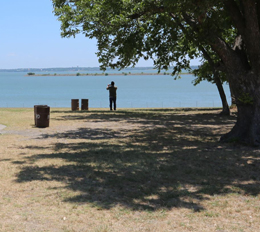The July 4th holiday is one of the most popular for water activities like boating and swimming. Please help ensure that you and your family will be safe on area lakes.
- Always wear a life jacket. Most fatality victims were recovered NOT wearing a personal floating device. Always carry extra PFD’s in adult and child sizes. Children younger than 13 must wear a PFD.
- Avoid alcohol. The probability of being killed in a boating accident doubles when alcohol is involved. Boating while intoxicated is strictly enforced and carries penalties similar to DWI.
- Take a boater education class. A majority of vessels involved in boating accidents are operated by persons 26-50 years of age. For information on the classroom, home video and online courses, visit Texas Parks and Wildlife Department Boater Education pages.
- Don’t overload your boat. Follow manufacturer’s guidelines.
- Operate at a safe speed. Although there are no set speed limits on the water, citations may be issued for excessive speed or recklessness. Use common sense and operate at a safe speed at all times. Excessive speed is a rate greater than is reasonable without regard for conditions and hazards or greater than will permit a person to bring the boat to a stop within the assured clear distance ahead.
- Always have a passenger serve as a lookout in addition to the operator.
- Watch out for low water areas or submerged objects.
- Be weather-wise. Always check local weather conditions before departure. If you notice darkening clouds, rough changing winds or sudden drops in temperature, get off the water.
- Develop a float plan. Whether you choose a family member or staff at a local marina, let someone else know your float plan. This should include where you’re going and for how long. A float plan can include the following information: name, address, and phone number of trip leader; name and phone number of all passengers; boat type and registration information; trip itinerary; types of communication and signal equipment onboard, such as an Emergency Position Indicating Radio Beacon or Personal Locator Beacon.
- Learn to swim. If you’re going to be in and around the water, proper boating safety includes knowing how to swim. Local organizations, such as the American Red Cross and others, offer training for all ages and abilities.
- Consider a free vessel safety check. Take advantage of a free vessel safety check from the U.S. Coast Guard. They offer complimentary boat examinations to verify the presence and condition of certain safety equipment required by state and federal regulations. They’ll provide a specialist to check out your boat and make helpful boating safety tips and recommendations. They also offer virtual online safety checks as well.
- Personal watercraft operators and passengers must wear a U.S. Coast Guard approved PFD. Before you borrow or rent a PWC, take the time to learn how to operate the vessel and the rules of the waterway. Obey the 50-foot rule. Maintain a 50-foot distance from other PWC’s, vessels, persons, shore, or stationary platform or another object unless operating at headway (idle) speed.
Sources: http://tpwd.texas.gov/fishboat/boat/safety/ and http://www.kristv.com/story/31956242/texas-park-and-wildlife-boating-safety-tips


